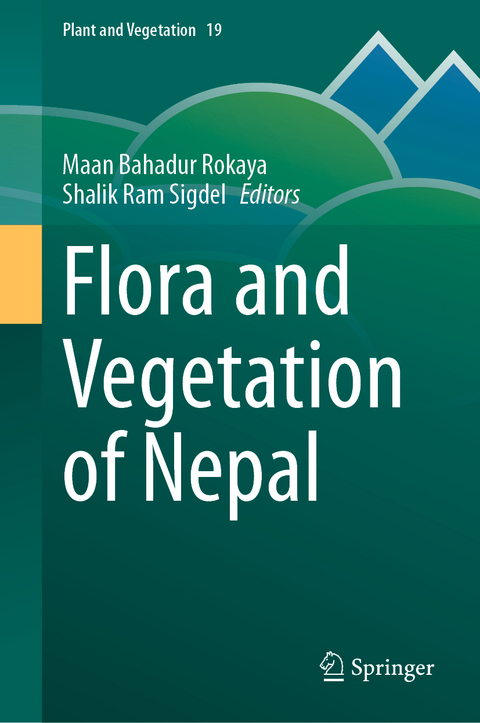
Flora and Vegetation of Nepal
Springer International Publishing (Verlag)
978-3-031-50701-4 (ISBN)
This volume highlights the plant life of Nepal, which accounts for 20% of the Himalayan biodiversity. For the first time, this group of authors compile over 200 years' worth of local botanical research. Due to the high topographical diversity, Nepal has a very unique flora and vegetation.
The chapters focus on cryptogams, phanerogams and alien flora. As an added bonus, historical background for native and invasive species, is explained. Aside from botanical knowledge, the authors also shed a light on Nepali geography, soil, climate and land use. To complete the picture, readers will find data on different plants, maps and photographs of unique species.
This book is a valuable resource for Botanists and Ecologists, but also for interested travelers who would like to complement their next trek in Nepal.Maan Bahadur Rokaya is currently working as a research scientist at the Institute of Botany and the Global Change Research Institute, both affiliated with the Czech Academy of Sciences. Rokaya obtained his MSc in Botany, specializing in Plant Taxonomy and Systematics, from Tribhuvan University located in Kathmandu, Nepal, in 2001. Subsequently, he pursued his PhD in plant ecology from Charles University in Prague, completing his studies in 2011. The primary focus of his research is mainly on the plant population dynamics of important plant species, herbivory patterns along the elevational gradient, the effects of climate change on plant species, and the spatial distribution of plants, butterflies, and birds, mainly in the Himalayas. He has authored many scientific papers and book chapters. He is the academic editor for the Evidence-Based Complementary and Alternative Medicine (eCAM) Journal and serves as a reviewer for numerous esteemed international journals.
Shalik Ram Sigdel is working as an Associate Researcher at the Institute of Tibetan Plateau Research, Chinese Academy of Sciences. Sigdel received his MSc in Botany (Ecology) from Tribhuvan University, Kathmandu, Nepal, in 2004 and his PhD in Physical Geography (Treeline Ecology) from the Institute of Tibetan Plateau Research, Chinese Academy of Sciences in 2017. His research focuses on understanding alpine plant responses to changing climate at multiple spatial scales using dendroecological and trait-based approaches, particularly in the Himalayas. He has authored or co-authored about 30 scientific papers. He is serving as a review editor for Frontiers of Plant Science.
Chapter 1: Nepal: An Introduction.- Chapter 2: Flora and Phytogeography of Nepal.- Chapter 3: Vegetation and forest in Nepal.- Chapter 4: An overview of the Middle Miocene to Early Pleistocene Flora of the Siwalik sediments in Nepal.- Chapter 5: A Comprehensive Review of Algal Exploration in Nepal.- Chapter 6: Fungi of Nepal.- Chapter 7: Bryophyta Plant Diversity in Nepal.- Chapter 8: Lichens of Nepal.- Chapter 9: Fern and fern-allies of Nepal.- Chapter 10: Gymnosperms of Nepal: diversity, distribution, economic importance and future perspectives.- Chapter 11: Angiosperm diversity in Nepal.- Chapter 12: Economically important plants in Nepal.- Chapter 13: Plant invasions in Nepal: What we do not know?.- Chapter 14: Impact of climate change on plants in the Nepal Himalayas.- Chapter 15: Plant Biodiversity Conservation in Nepal Himalaya: Status, Policies, and Legislative Frameworks.
| Erscheinungsdatum | 30.04.2024 |
|---|---|
| Reihe/Serie | Plant and Vegetation |
| Zusatzinfo | XXIII, 447 p. 89 illus., 80 illus. in color. |
| Verlagsort | Cham |
| Sprache | englisch |
| Maße | 155 x 235 mm |
| Themenwelt | Naturwissenschaften ► Biologie ► Ökologie / Naturschutz |
| Weitere Fachgebiete ► Land- / Forstwirtschaft / Fischerei | |
| Schlagworte | Botany • cryptogams • Himalayan Region • Invasive species • Nepal • Phanerogams |
| ISBN-10 | 3-031-50701-0 / 3031507010 |
| ISBN-13 | 978-3-031-50701-4 / 9783031507014 |
| Zustand | Neuware |
| Haben Sie eine Frage zum Produkt? |
aus dem Bereich


